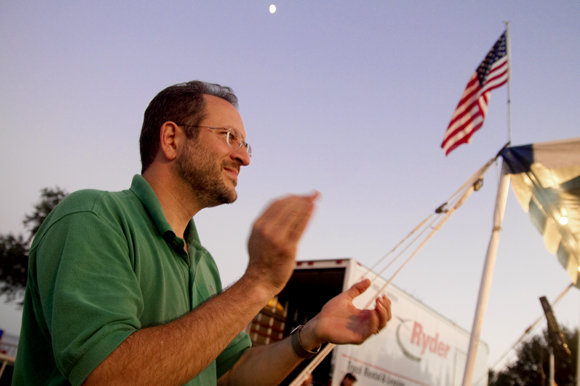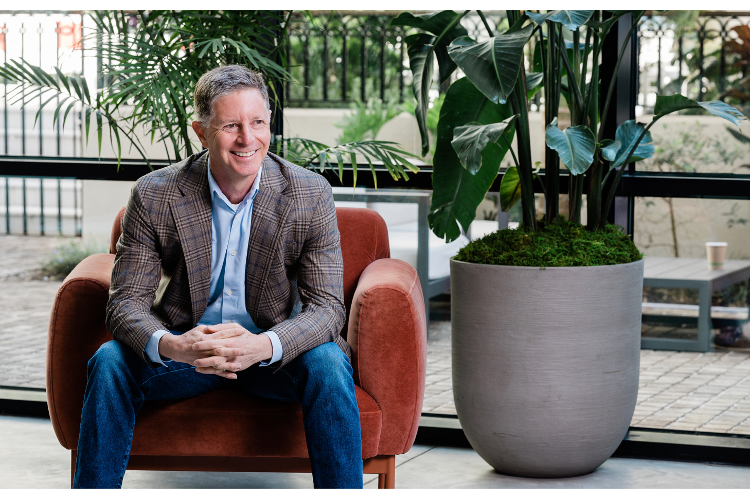Q&A: Michael Pastreich, Florida Orchestra
In planning for long-term sustainability of The Florida Orchestra, CEO Michael Pastreich looked to the writings of business researcher Jim Collins, author of “Good To Great” and “Built To Last.” While these books were originally written with for-profit businesses in mind, Pastreich finds that Collins’ work applies in the nonprofit arts world as well.
In almost three years as President & CEO of The Florida Orchestra, Michael Pastreich has helped guide major changes to the organization, which for many years has flourished musically but faced financial challenges.
Since his arrival, Music Director Stefan Sanderling committed to remaining as music director at least through 2013, the Coffee Series grew from six to seven performances in St. Petersburg and launched with a three-concert series in Clearwater, and ticket sales for all series grew at unprecedented rates. The orchestra has balanced its budget in two of the last three seasons, has grown its endowment by over $5 million and has eliminated over 35 percent of its long-term debt.
Recently Pastreich sat down with Palladium Theater Executive Director Paul Wilborn to talk about how books by Jim Collins (“Good To Great,” “Built To Last”) have helped set a new course for The Florida Orchestra.
PW: How does “Good To Great” apply to a nonprofit with a volunteer board? How has it worked at The Florida Orchestra?
MP: When I got to The Florida Orchestra, expenses were tight. We established a sustainability campaign. The plan had an aggressive expense control aspect and a plan for income generation.
In a for-profit world, the ultimate goal is to make a profit, but you can’t make money long-term if you aren’t idealistic. In the nonprofit world, the ultimate goal is idealism, but you can’t get there without the finances. Board members not only have to say this is a good idea, but this is a good idea and I want to give $100,000 to make this possible.
PW: Collins writes about “facing the brutal facts.” How does that apply in running a large orchestra?
MP: We tried very hard to be as candid as we can, and we found the transparency enabled the folks who care about us to know how to help us. The month after I arrived, I thought we were going to miss payroll. I met with the musicians and the staff and I made two promises.
First, if we missed a payroll – if we only paid (the staff and musicians) 90 percent, then Stefan (Sanderling) and I won’t take any pay. “We are the leaders and you need to know that our personal well-being is profoundly tied to yours.”
Second, I promised that whatever happens, nobody will be surprised. And since then I’ve been writing these fairly long, elaborate updates on a more or less weekly basis that really address our core issues and what do we plan to do.
We are likely to have the first deficit since I’ve been here. And it is likely to be a big one. And to be responsible, we’ll have to take very serious action to make sure it does not repeat next year. But that doesn’t negate the fact that we had over a 40 percent increase in single ticket revenue this year. To the best of my knowledge, that is the largest increase of any orchestra in the country.
PW: Collins writes about the concept of the hedgehog. What is he talking about?
MP: The concept is based on a fable about a fox that wants to catch a hedgehog. Each day, the fox tries to find a new way to catch it; one day he hides behind a rock, the next day he jumps out of a tree. As the fox constantly invents new, clever techniques, the hedgehog has perfected one simple technique; he rolls up into an impenetrable ball.
The Hedgehog Concept is a tangible way to create a vision for your organization. My challenge as a strategist and a planner is that vision is a mushy word. Vision often gets devolved into “if it succeeds, it must be visionary. If it isn’t succeeding, it must not be visionary.”
The Hedgehog Concept defines three drives: What do you do best in the world? What are you passionate about? What is your economic engine?
PW: OK, what do you believe is the orchestra’s economic engine?
MP: I believe it is our Masterworks subscribers. Subscribers are the most sustainable form of revenue. Masterworks are the most sustainable of all types of subscribers. A larger percent of them make a gift than any other category. Their average gift is higher than any other category and more of the board comes from them than any other category. So if Masterworks subscribers are going up, in the end any problem can be fixed.
PW: Define its passion?
MP: We’re passionate about constant improvement. An aim for excellence. I see that in the musicians onstage. I see that as we are trying to figure out how to fundraise. I see it in our marketing materials and I see it in who we are bringing on our board.
PW: And, what does The Florida Orchestra do best in the world?
MP: We bring the Tampa Bay area together as a single community. We are the only cultural organization that performs in all three communities.
Our subscribers have free, unlimited exchange privileges (among Mahaffey Theater, Ruth Eckerd Hall and the Straz Center). People are exchanging tickets and they are driving across bridges between all three of our communities, in both directions, on a regular basis.
So when we follow our hedgehog concept and make decisions that are entirely focused on improving our Masterworks subscribership, focusing on excellence and unifying the Tampa Bay area, I think that is vision.
PW: How have you applied Collins’ concepts during the recent economic downturn?
MP: Once you’ve got all these things in place — have the right people, know your brutal reality, know what your hedgehog is — then it is just a matter of staying disciplined.
The Florida Orchestra has removed over $2 million of expense from our budget while serving the community better in virtually every way.
PW: What’s the future for The Florida Orchestra?
MP: It normally takes three years to build a hedgehog. My first year was focused on getting some vague sense of order out of chaos. My second year was really about “let’s get a tactical plan we can all agree on.” This year has really been about ,”What is The Florida Orchestra really going to look like so that it can remain nimble and be even greater for my daughter than it is for me?”
Paul Wilborn and his wife, Eugenie Bondurant, are restoring an historic home near downtown St. Petersburg. This interview was edited for brevity. Comments? Contact 83 Degrees.
















